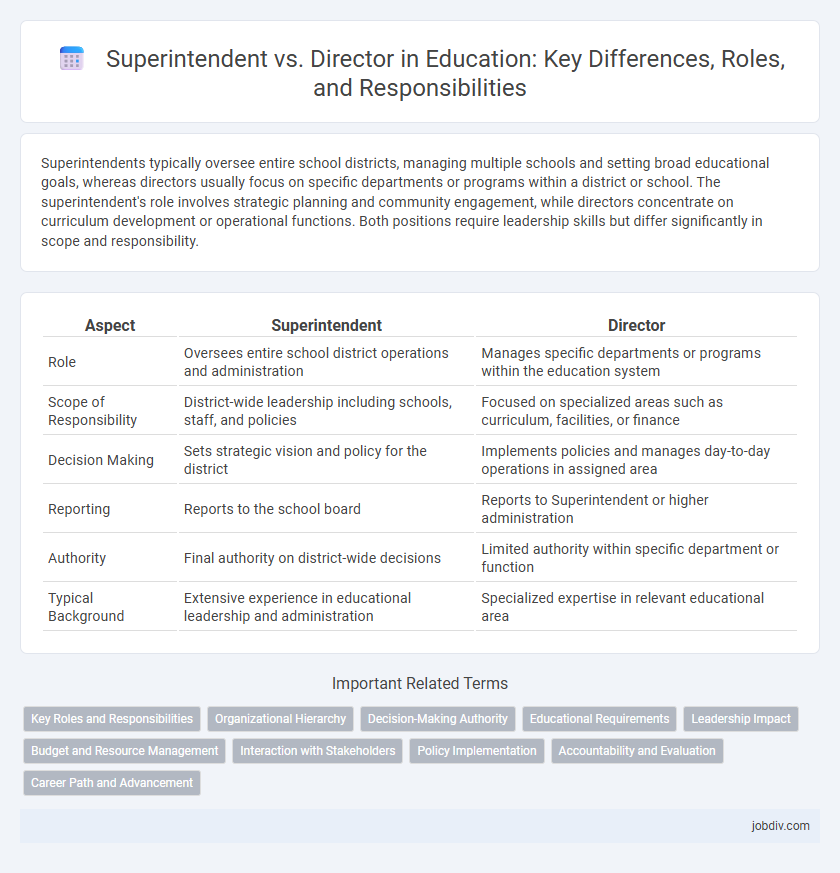Superintendents typically oversee entire school districts, managing multiple schools and setting broad educational goals, whereas directors usually focus on specific departments or programs within a district or school. The superintendent's role involves strategic planning and community engagement, while directors concentrate on curriculum development or operational functions. Both positions require leadership skills but differ significantly in scope and responsibility.
Table of Comparison
| Aspect | Superintendent | Director |
|---|---|---|
| Role | Oversees entire school district operations and administration | Manages specific departments or programs within the education system |
| Scope of Responsibility | District-wide leadership including schools, staff, and policies | Focused on specialized areas such as curriculum, facilities, or finance |
| Decision Making | Sets strategic vision and policy for the district | Implements policies and manages day-to-day operations in assigned area |
| Reporting | Reports to the school board | Reports to Superintendent or higher administration |
| Authority | Final authority on district-wide decisions | Limited authority within specific department or function |
| Typical Background | Extensive experience in educational leadership and administration | Specialized expertise in relevant educational area |
Key Roles and Responsibilities
Superintendents oversee entire school districts, managing budgets, policy implementation, and district-wide academic performance, ensuring compliance with state regulations. Directors focus on specific departments such as curriculum, special education, or technology, developing programs and strategies to improve educational outcomes within their domain. Both positions require leadership skills, but superintendents have broader administrative authority while directors provide specialized expertise.
Organizational Hierarchy
Superintendents typically oversee entire school districts, managing multiple schools and setting broad educational policies, while Directors usually handle specific departments or programs within those districts, such as curriculum or special education. The organizational hierarchy places Superintendents at a higher level with comprehensive administrative authority, whereas Directors report to Superintendents or other senior administrators. Understanding this distinction clarifies decision-making structures and responsibility distribution in educational institutions.
Decision-Making Authority
Superintendents typically hold the highest decision-making authority in school districts, overseeing district-wide policies, budgeting, and strategic planning to ensure effective educational outcomes. Directors usually manage specific departments or programs within the district, exercising decision-making power limited to their area of expertise, such as curriculum development or special education. The superintendent's role encompasses broader leadership and accountability, while directors provide specialized guidance within their domains.
Educational Requirements
Superintendents typically require a master's degree in educational leadership or administration, with many districts preferring doctoral degrees, reflecting their role in overseeing entire school systems. Directors often hold a master's degree relevant to their specific area, such as curriculum development or special education, emphasizing specialized expertise over broad administrative responsibilities. Both positions demand strong knowledge of educational policies, but superintendents must also possess advanced skills in organizational management and community relations.
Leadership Impact
Superintendents drive district-wide educational vision, managing large-scale budgets, policies, and community relations to enhance school performance and student outcomes. Directors typically oversee specific departments or programs, implementing targeted initiatives and ensuring alignment with overall district goals. Both roles require strategic leadership, but superintendents influence system-wide change while directors focus on specialized operational impact.
Budget and Resource Management
Superintendents oversee the entire district budget, allocating resources across multiple schools to ensure equitable distribution and fiscal responsibility. Directors manage specific departmental budgets, focusing on optimizing resources within their areas such as curriculum development or special education programs. Effective budget and resource management by both roles is critical for maximizing educational outcomes and maintaining financial stability.
Interaction with Stakeholders
Superintendents maintain consistent communication with school boards, parents, and community leaders to align district goals and policies effectively. Directors often engage more directly with teachers, staff, and specific departments to implement programs and address operational needs. Both roles require strategic interaction to foster collaboration and support student achievement across educational environments.
Policy Implementation
Superintendents oversee the implementation of educational policies across entire school districts, ensuring alignment with state regulations and board directives. Directors focus on specific departments or programs, managing policy execution within their areas to meet district-wide educational goals. Effective policy implementation requires collaboration between superintendents and directors to translate strategic objectives into actionable practices.
Accountability and Evaluation
Superintendents hold primary accountability for district-wide outcomes, including student performance, staff effectiveness, and operational success, with their evaluations often based on comprehensive metrics such as academic progress, budget management, and community engagement. Directors typically oversee specific departments or programs, focusing accountability on targeted goals and the implementation of policies within their domain, with evaluations centered on program effectiveness and team leadership. The distinction in accountability and evaluation reflects the superintendent's overarching leadership role versus the director's specialized administrative responsibilities.
Career Path and Advancement
Superintendent roles typically require extensive experience in district-level management, often progressing from positions such as principal or director of curriculum, emphasizing leadership with direct oversight of multiple schools. Directors usually advance through specialized areas like curriculum development or educational technology, focusing on subject-specific expertise before moving into broader administrative roles. Career advancement for superintendents often leads to executive positions within educational agencies or school boards, while directors might transition into superintendent roles or senior administrative positions depending on their strategic impact and leadership scope.
Superintendent vs Director Infographic

 jobdiv.com
jobdiv.com